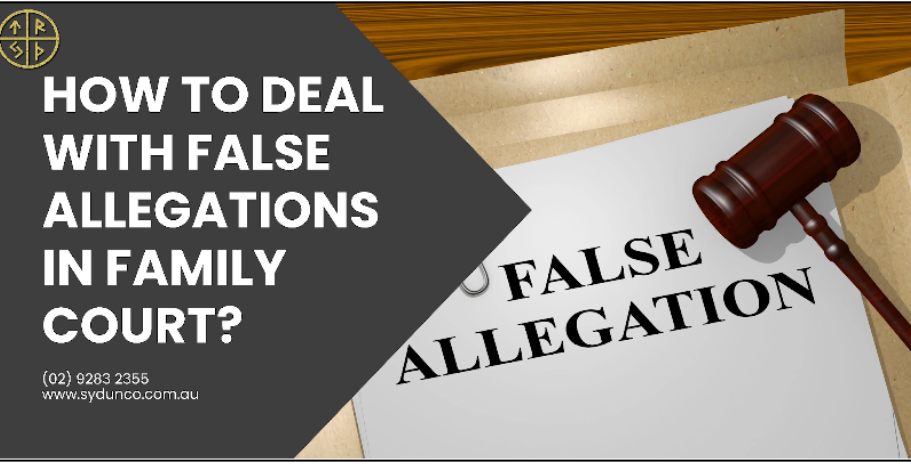Facing false allegations in family court can be very stressful. These accusations can hurt your personal and professional life, damage your reputation, and affect the outcomes of your case, especially when it comes to child custody and visitation rights.
To handle this tough situation, you need to understand the legal process, take smart action, and get help from professionals like an Australian Family Law Solicitor. This guide will help you effectively manage false allegations in a family court in Australia.
What Are False Allegations?
False allegations in family court are unfounded claims made by one person against another. These can include accusations of domestic violence, child abuse, substance abuse, or infidelity.
Often, these allegations are made to gain an advantage in custody battles or property settlements. False allegations can have serious consequences, causing emotional distress, financial strain, and harm to your relationships with your children.
Therefore, it’s best to hire an experienced family law solicitor to help you achieve the best possible outcome.
How to Deal with False Allegations?
- Stay Calm and Seek Legal Advice
The first step is to stay calm. Panicking or reacting impulsively can make things worse or even a lot worse. Get legal advice from a reliable family law solicitor who knows family court matters well. If you don’t have a family lawyer, you can hire one by searching “family solicitors near me” on your browser.
They can guide you through the legal process, explain your rights, and help you develop an effective strategy to counter the allegations.
- Gather Evidence
Collecting evidence to disprove false allegations is crucial. This might include:
- Witness Statements: Get relevant statements from people who can vouch for your character and behaviour.
- Documentation: Collect emails, text messages, and social media interactions that contradict the allegations.
- Medical Records: If accused of physical abuse, medical records showing no injuries can be very important.
- Financial Records: If accused of financial misconduct, provide clear and accurate financial statements.
Financial misconduct can be a false allegation in business scenarios as well. In such cases, you need to consult your Business Solicitors.
- Maintain a Record
Keep detailed records of all interactions with the accusing party. Document conversations, emails, and any incidents that may be relevant. This can help create a timeline and context to refute the false claims.
- Avoid Direct Confrontation
Avoid direct confrontation with the accuser. This can escalate the situation and may be used against you in court. Communicate through your family law solicitor and follow their advice on how to handle interactions with the accused party. They have dealt with very similar situations and will know what works and what doesn’t and can be a lifesaver in such stressful situations.
- Focus on Your Children
If the allegations involve child custody, prioritise your children’s well-being. Maintain a stable and loving environment for them and ensure their needs are met. Showing your commitment to your children’s welfare can positively influence the court’s perception, too.
Consequences of False Allegations
False allegations in family court can have wide-reaching effects, including:
- Legal Repercussions
Making false allegations can lead to legal consequences for the accuser, like being charged with perjury or facing defamation lawsuits. Courts may also impose penalties on those who make false claims to manipulate the legal process. Family lawyers can help deal with all aspects of family disputes.
- Emotional Impact
False allegations can cause significant emotional distress, cause anxiety, depression, and a sense of helplessness. It can also affect relationships with close family and friends. You may need to seek professional support from a counsellor or psychologist.
- Financial Strain
Defending against false allegations can be expensive. Legal fees, court expenses, and costs related to gathering evidence can add up quickly, causing financial strain. Therefore, when you search for “family solicitors near me”, look for their pricing policy to be sure it’s within your budget.
- Impact on Children
Children caught in the middle of false allegations can experience emotional turmoil. The conflict between parents can affect their mental health and well-being, leading to long-term consequences. Seek advice from professionals if you need help navigating this difficult time such as counsellors, family lawyers and helplines.
Ways to Disprove False Allegations in Family Court?
Presenting Evidence
The best way to disprove false allegations is to present strong evidence. This might include:
- Witness Testimony: Credible witnesses can provide statements that support your innocence.
- Expert Witnesses: Professionals like psychologists, doctors, or financial experts can offer opinions that counter the allegations.
- Surveillance Footage: Video evidence can sometimes disprove false claims.
- Electronic Communications: Emails, text messages, and social media posts can provide a clear picture of events.
- Cross-Examination
During court proceedings, your family law solicitor can cross-examine the accuser and their witnesses. This process can reveal inconsistencies or falsehoods in their testimony.
- Character References
Submitting character references from employers, colleagues, friends, and family members can help show your integrity and good character. These references can be especially convincing if they come from respected individuals.
- Professional Evaluations
In child custody cases, the court may order professional evaluations, such as psychological assessments or home visits by social workers. These evaluations can provide an objective perspective on the allegations and each parent’s suitability for custody.
- Legal Representation
Having a skilled family law solicitor on your side is crucial. They can navigate the complexities of family court, present your case effectively, and advocate for you. Look for family solicitors near you with experience in handling false allegations and a track record of success.
Frequently Asked Questions
- Can false allegations have legal repercussions for the accuser?
Yes, making false allegations can have legal repercussions for the accuser. They might face charges of perjury, defamation lawsuits, or court-imposed penalties such as costs orders against the accuser. False allegations are taken seriously and can lead to significant consequences.
- How can a family law solicitor help with false allegations?
A family law solicitor can offer expert legal advice, help you understand your rights, develop a strategy to counter false allegations, and represent you in court. They can also help gather and present evidence to support your case.
- Why is it important to avoid direct confrontation with the accuser?
Avoiding direct confrontation with the accuser is important because it can escalate the situation leading to violence and be used against you in court. Communicate through your solicitor, follow their advice, and focus on building a strong, evidence-based defence.
- How can I find a family law solicitor near me?
To find a family law solicitor near you, search online directories, ask for suggestions from friends or family, or contact local legal associations. Look for solicitors with experience in handling false allegations and a good track record in family court matters.
The Conclusion
False allegations in family court are serious and require a strategic response. By understanding false allegations, seeking professional legal advice from a family law solicitor, gathering evidence, and presenting a strong defence, you can protect your rights and interests. The consequences of false allegations can be severe, but with the right approach, you can navigate this tough situation effectively and calmly.



